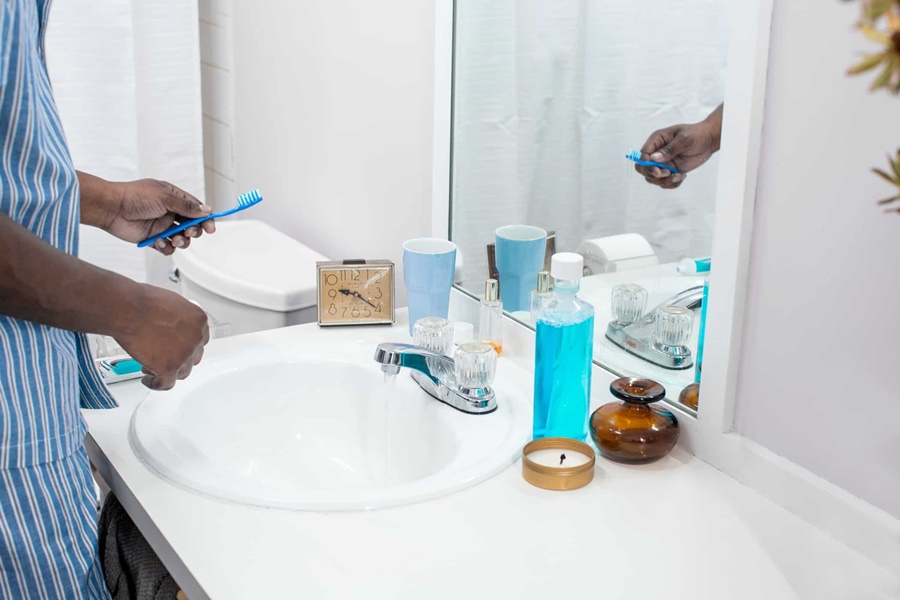A foul, sewer-like smell coming from your bathroom sink is not just unpleasant it can also indicate a deeper plumbing issue that needs attention. Whether it’s a one-time problem or a persistent odor, understanding the cause is the first step toward resolving it. Here’s a breakdown of the most common reasons your sink might smell like a sewer and what you can do about it.
1. Dry P-Trap
What It Is
The P-trap is the curved section of pipe under your sink. It’s designed to hold a small amount of water that acts as a barrier to prevent sewer gases from coming back up into your bathroom.
Why It Smells
If the sink hasn’t been used for a while (common in guest bathrooms), the water in the P-trap can evaporate, allowing sewer gases to escape into the room.
How to Fix It
Run water in the sink for 30 seconds to refill the P-trap. This should stop the smell almost immediately. To prevent it from happening again, run the water regularly—even once a week is enough.
2. Clogged or Dirty Drain
What It Is
Hair, soap scum, toothpaste, and other debris can accumulate in your sink’s drain over time, creating a slimy film known as biofilm.
Why It Smells
This buildup can start to rot or grow bacteria, which gives off a strong, sewage-like odor.
How to Fix It
Clean the drain: Remove the stopper and use a drain brush or a bent wire to clear debris.
Flush with baking soda and vinegar: Pour ½ cup of baking soda followed by ½ cup of vinegar down the drain. Let it sit for 15 minutes, then flush with hot water.
Use enzyme cleaners: These break down organic material without harming your pipes.
3. Blocked or Improper Venting
What It Is
Your plumbing system includes vent pipes that allow sewer gases to escape and keep water flowing smoothly through your pipes.
Why It Smells
If the vent pipe is blocked (e.g., by leaves, a bird nest, or ice), the pressure in your plumbing can get thrown off, allowing gas to escape through your sink drain.
How to Fix It
This usually requires a professional plumber. They’ll check the vent pipe often located on the roof and clear any obstructions.
4. Leaky or Cracked Pipes
What It Is
Over time, pipes under your sink or in your walls can crack or become loose, especially if they weren’t installed properly.
Why It Smells
Even a small leak can allow sewer gas to escape before it reaches the vent. This is especially true in older homes or bathrooms that were DIY renovated.
How to Fix It
Check under the sink for signs of water damage or dripping. Tighten any loose connections. If the smell persists, call a plumber to inspect hidden or hard-to-reach pipes.
5. Bacterial Growth in the Overflow Hole
What It Is
Most sinks have an overflow hole near the top that prevents the sink from spilling over. Water and debris can collect inside, especially if the sink is used frequently.
Why It Smells
Over time, bacteria can grow inside the overflow channel, producing a foul odor.
How to Fix It
Mix a solution of equal parts bleach and water.
Pour it into the overflow hole slowly.
Use a small brush (like a pipe cleaner) to scrub if needed.
Rinse with hot water.
6. Sewer Line Issues
What It Is
The problem might not be with your sink at all it could be a bigger issue with your home’s main sewer line.
Why It Smells
Cracks, clogs, or backups in your sewer line can send gas and waste back up into your home’s plumbing system.
How to Fix It
This is a serious issue that requires immediate professional help. Look for signs like multiple drains smelling or gurgling, or sewage backups elsewhere in your home.
When to Call a Plumber
If you've tried basic cleaning and the smell persists for more than a few days, or if the odor is especially strong, it's time to bring in a professional. Persistent sewer smells can indicate dangerous levels of hydrogen sulfide gas, which is both toxic and flammable.
Conclusion
A smelly bathroom sink isn't just an inconvenience it can be a warning sign of something more serious. Fortunately, most causes are easy to identify and fix. Start with simple cleaning and water flushing, and work your way up to checking vents or calling in a pro. Regular maintenance can keep your sink and your bathroom smelling fresh and safe.

